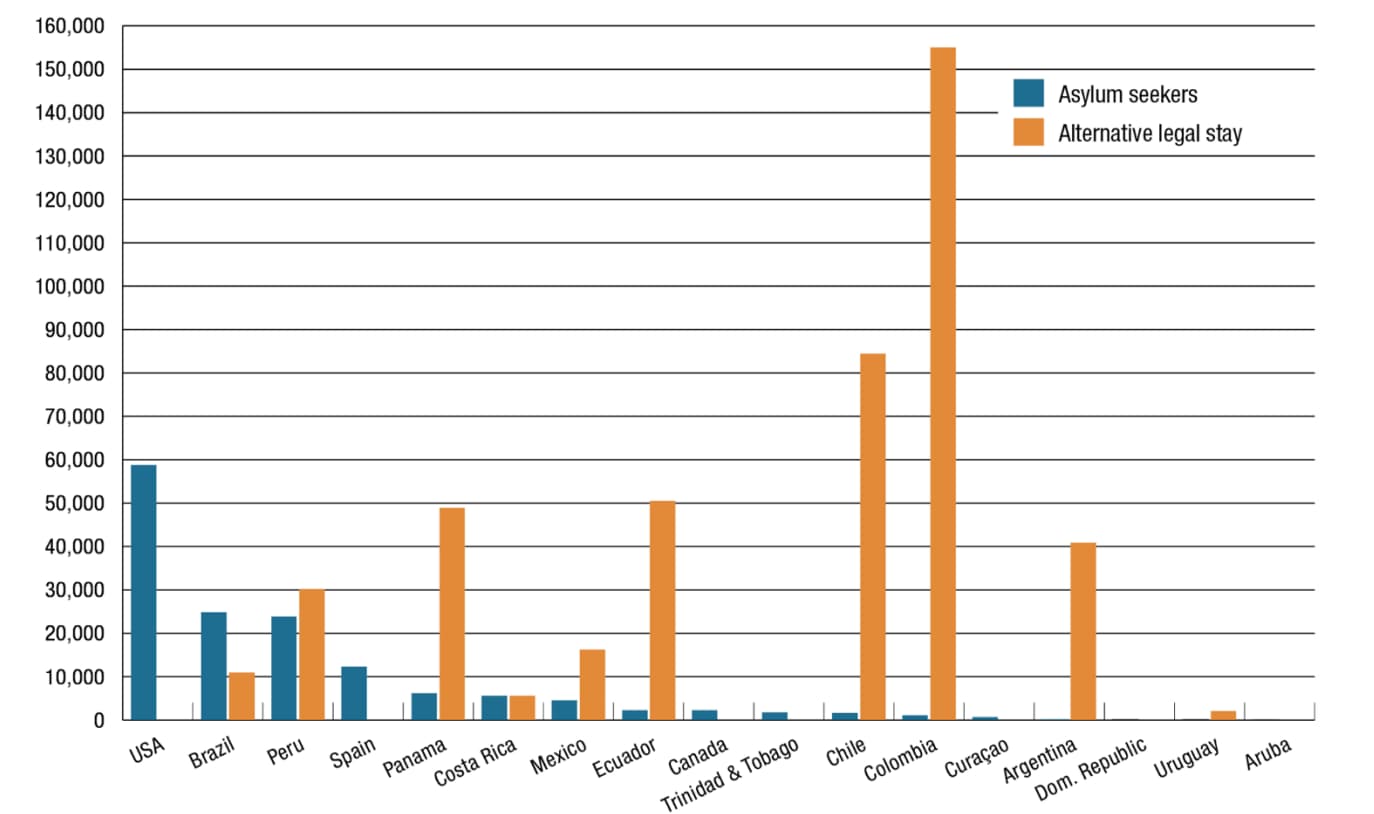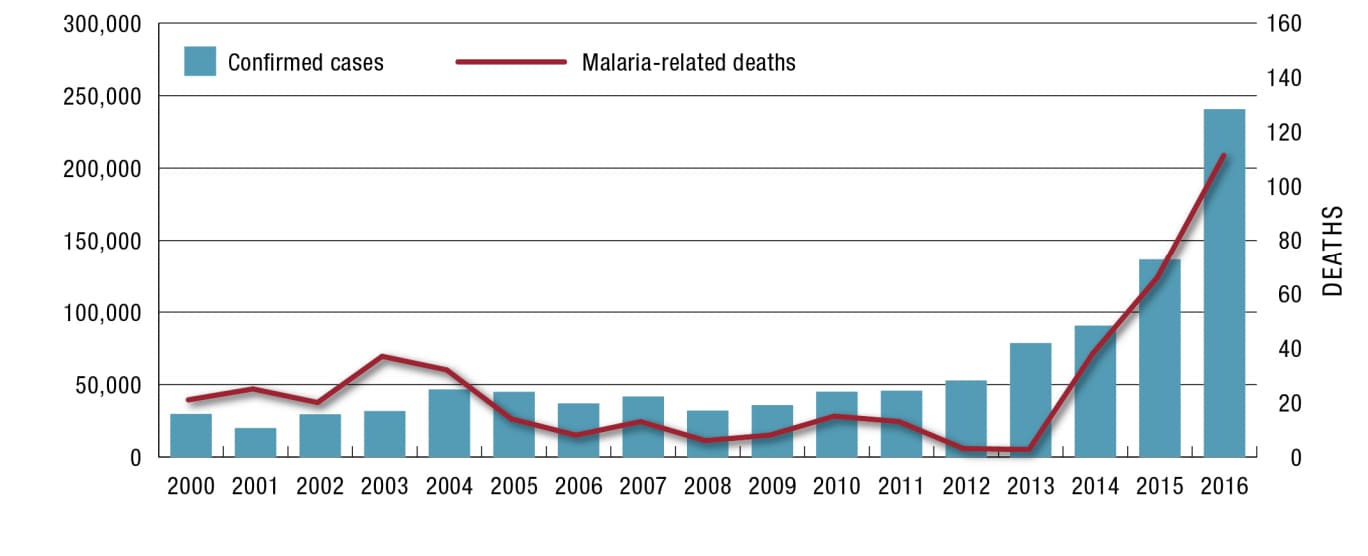How to contain the deepening crisis in Venezuela

Poorer by the day, hundreds of thousands of Venezuelans have concluded that escape is their only option Image: Reuters/Jaime Saldarriaga

Get involved with our crowdsourced digital platform to deliver impact at scale
Stay up to date:
Migration
This article is part of the World Economic Forum's Geostrategy platform
Financial collapse and hyperinflation make Venezuela an economic disaster zone.
The crisis is no longer confined to one nation: refugees and migrants are streaming into neighbouring countries. Epidemics and violent crime are spilling over borders, endangering Colombia’s fragile peace process in frontier regions.
As Venezuela’s President Nicolás Maduro looks to cement his hold on power, his country is sinking into a trough of misery.
Hyperinflation has compounded the scarcity of food and medicines. Epidemics of preventable diseases and a child malnutrition crisis are increasingly deadly. Violent crime has spiked.
An estimated four million Venezuelans have emigrated, with tens of thousands crossing the border with Colombia each month in search of a new home. Venezuela’s neighbours, once bystanders to its domestic tensions, face a catastrophe on their doorsteps.

Latin American governments, the UN, European Union and US must redouble efforts to manage the humanitarian crisis, including by ensuring neighbouring countries have the resources to cope.
They also should lobby, ideally together with China, for renewed government-opposition talks aimed at reforms enabling more representative politics and economic recovery; threatening further sanctions might help push the government toward concessions.
The turbulence of 2017 has magnified Venezuela’s hardship and the difficulty of finding remedies.
While the government has snuffed out months of civil unrest, stripped the opposition-run National Assembly of its power and established a new Constituent Assembly with authority over all Venezuelan institutions, it has made little effort to ameliorate the country’s economic woes.
Instead, it claims to be protecting the Venezuelan public against foreign powers and their domestic allies, decrying reports of the very real humanitarian crisis as lies aimed at prompting an “imperialist intervention”. It is also blocking efforts to provide food and medical aid.
The creeping authoritarianism of the latter years of former President Hugo Chávez’s rule and the first years under Maduro has metastasised into full-blown partisan exploitation of state and judicial institutions.
Information that challenges official accounts is brushed aside: the state publishes neither reliable economic data nor credible health statistics. A full-scale default on the foreign debt appears but a matter of time. Scarcity and hunger have led to increased, albeit still sporadic, looting.

The public sector’s degradation has left a deep mark in peripheral regions. In its quest for hard currency, the government has set aside over 100,000 square kilometres for mining. Its lack of regulation breeds collusion among the military, criminal gangs and Colombian guerrillas.
Migrants heading to Colombia must dodge competing state security forces and armed irregulars in border areas. After crossing, the poorest are left to eke out a living in a region with one of Colombia’s highest unemployment rates.
Malaria is again common and spreading across borders. Diseases that had been eradicated, such as measles and diphtheria, have returned.

Despite its dismal economic record, the government occupies a strong position.
The Venezuelan opposition is divided and rudderless. A sizeable segment of the electorate will vote for Maduro, either out of loyalty or due to dependence on the government for food rations and other subsidised goods. The electoral authority remains under executive control, and has proven itself willing to bend the rules in the ruling party’s favour and even, in one instance, seemingly to commit outright fraud.
Harder-line opposition factions hope for a U.S. oil embargo or foreign intervention as a shortcut to a transition, but the dangers such actions entail in a country besieged by violence and hunger are too great to countenance. Instead, Latin American governments, together with Western and other powers, should take advantage of the strong international and regional consensus that exists on Venezuela’s plight to intensify efforts to resolve the crisis.
The first priority is to alleviate the human suffering.
The Maduro government should accept the creation of a tripartite group, proposed by humanitarian groups, comprising representatives of the Venezuelan state, civil society and specialised UN bodies, which would coordinate the provision of humanitarian assistance. Such a body should address the government’s fears that allowing aid groups to deliver food would enable outside interference. The UN should work with Venezuela’s neighbours to help them provide for Venezuelans leaving their country.
The second priority is to revive talks between government and opposition. Ideally, the government would postpone forthcoming presidential elections, but even if the polls go ahead, the priority afterward should be a swift return to meaningful negotiations.
The US, Canada and the EU have sanctioned the government, and several regional leaders are considering following suit. In themselves, such sanctions rarely prove effective. But in Venezuela’s case, the threat of further sanctions, especially those imposed by Latin American governments, might improve prospects for negotiations, provided that threat was accompanied by reinvigorated diplomacy and tied to specific, realistic concessions demanded of the Maduro government.
Talks should focus not only on specific electoral reforms, but on wider transitional measures, including opposition representation in key state institutions, economic reform and guarantees for top regime officials were they to eventually lose power.
While past rounds have failed, negotiations between the regime and opposition, facilitated by regional or other leaders, backed by concerted international pressure and aimed at establishing a more inclusive political order and restoring checks and balances, remain the only way out of the crisis.
Recommendations
To address the humanitarian crisis stemming from the scarcity of food, medicines and other basic goods, and the consequent mass migration to neighbouring countries:
- The Venezuelan government should facilitate the provision by international humanitarian organisations of food, medicines and other supplies vital for saving human lives, inter alia by relaxing import and exchange controls, and cease the persecution of those seeking to alleviate suffering.
- It should also agree to the formation of the tripartite group proposed by humanitarian organisations, comprising representatives of the state, civil society and specialised UN bodies, and having no agenda other than coordinating the provision of humanitarian assistance, based on principles of strict neutrality.
- The UN should follow up on Secretary-General António Guterres’s commitment to provide assistance to Venezuela’s neighbours to help them cope with the migration crisis; it should also provide clear and public information on issues such as health, welfare and social programs.
- Venezuela’s immediate neighbours should work with multilateral bodies, particularly the UN, to ensure the needs of migrants are adequately met and those at risk of trafficking, including women and girls, are protected as best possible.
- Colombia should adapt its migration law and regulations governing educational and health services to eliminate bureaucratic obstacles to their provision for migrants.
Containing the shock waves from Venezuela, International Crisis Group
Don't miss any update on this topic
Create a free account and access your personalized content collection with our latest publications and analyses.
License and Republishing
World Economic Forum articles may be republished in accordance with the Creative Commons Attribution-NonCommercial-NoDerivatives 4.0 International Public License, and in accordance with our Terms of Use.
The views expressed in this article are those of the author alone and not the World Economic Forum.
The Agenda Weekly
A weekly update of the most important issues driving the global agenda
You can unsubscribe at any time using the link in our emails. For more details, review our privacy policy.
More on Resilience, Peace and SecuritySee all
Lisa Satolli
April 18, 2024
Kate Whiting
April 4, 2024
Spencer Feingold
March 22, 2024
Weekend reads: Our digital selves, sand motors, global trade's choke points, and humanitarian relief
Gayle Markovitz
March 15, 2024
Kalkidan Lakew Yihun
March 11, 2024
Liam Coleman
March 7, 2024






